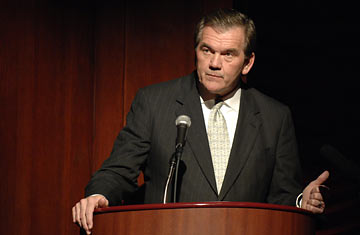
Tom Ridge at the Bob Bullock Museum in Austin, Texas
Former Homeland Security Secretary Tom Ridge does not want to "second-guess" the motivations of his former colleagues in the Bush Administration. But with a new memoir, The Test of Our Times, about to hit bookstores, he is ready to talk about all the second thoughts he has been having.
For instance, he thinks waterboarding "was and is torture," and he wishes the Bush Administration had not permitted it. He thinks President George W. Bush should have gone to Congress sooner to get permission to expand the National Security Agency's domestic-spying program. He even frowns upon the Bush policy of indefinite detention for suspected terrorists, a policy that the Obama Administration has hinted it may continue to some degree. "It seems inconsistent with a country that prides itself on the rule of law," Ridge said on Aug. 30 in an interview with TIME.
When it comes to the role of Homeland Security Secretary, there are also second looks aplenty. Even though Bush never invited him to a National Security Council meeting, Ridge thinks future Homeland Security chiefs should be asked occasionally to attend. He also says Homeland Security leaders need to be more careful than he was about allowing political language into their public statements.
In particular, he regrets his Aug. 1, 2004, decision to include political language praising Bush in a statement about raising the terrorism threat level. The statement was issued just as Democratic nominee John Kerry was enjoying a post-convention bump in the polls. But he stops short of questioning the intentions of the Bush aides who asked him to include the language in the first place; and contrary to pre-publication media reports that got many former Bush Administration officials up in arms, he claims that the decision to raise the alert was made without regard to political pressure. "I'm not going to second-guess," he says. "But it was wrong for me to put it in."
A few months later, however, Ridge says he did get the sense that politics might be at play. There was a heated discussion on the weekend before the 2004 election, in which Defense Secretary Donald Rumsfeld and Attorney General John Ashcroft made their case in vain to raise the terrorism threat level. Ridge now admits that he thought political calculation might have been at play. (Polls supporting Bush tended to spike when the terrorism threat level went up.) But he is not about to accuse either Rumsfeld or Ashcroft of letting politics cloud their judgment. "I'm not trying to second-guess two colleagues whose service I respect," he says.
Ridge welcomes the second looks that his successor, Secretary Janet Napolitano, has initiated at the department he helped create. Just a few weeks ago, Ridge says, he joined former Secretary Michael Chertoff in a discussion with Napolitano's advisers about the future of the color-coded terrorism-alert system. "Neither Secretary Chertoff nor I are married to five levels. We're not necessarily married to colors," Ridge says. "We were most concerned about reinforcing the notion that whether it's a color, whether it's a number, whether it's five, whether it's three, it is a signal that a level of security either goes up or down."
At the same time, Ridge says he worries about a certain "complacency" about preparing the nation and preventing another attack that has set in on Capitol Hill and among the wider American public. "For several years, the public debate and discussion was about funding priorities and technology," says Ridge, "and I don't hear much of that. It just concerns me because there is still a lot of need."
In particular, he wonders why, eight years after 9/11, there is still no first-responder communications system so that police and fire departments across the country can communicate in the event of an attack. And he worries about the continued lack of tracking ability for foreign nationals who overstay their visas. "We don't know today if everybody who came in lawfully with a visa in the last five years has gone home," he says. "What happened to that sense of urgency?"
The political memoir is always a delicate dance, and Ridge has handled it carefully. He still considers Bush a friend, and he has considerable praise for the public servants he worked with at the White House.
Ridge, who now works at his own consulting firm, Ridge Global, writes in his book, with co-author Lary Bloom, that he finally decided to pen a political memoir because "I thought my fellow citizens and public officials needed to know about what happened, what ought to have happened, and what we must do in the future to secure America and to raise the issue of security well above politics." It is an ambitious task for a 280-page book, but Ridge seems to touch on all of the highlights — the bureaucratic turf battles, the political pressures, the massive challenge and the occasional missteps.
But Ridge stops short of laying blame at the doorstep of his former colleagues, perhaps out of loyalty or perhaps because he would rather look forward. As he said on Sunday, "There is still unfinished business, so let's finish it."
